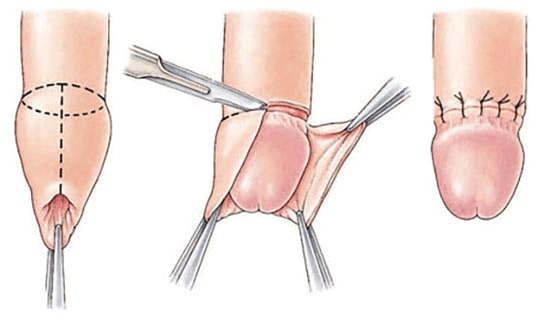Is Adult Circumcision Possible?
What is Circumcision?
Adult male circumcision involves the surgical removal of the foreskin, the retractable fold of skin covering the tip of the penis. Modern surgical techniques generally make this procedure painless and have no impact on fertility, ejaculation, or sexual pleasure.
What is the Purpose of Circumcision?
Understanding the purpose of circumcision goes beyond the simple medical procedure, delving into cultural, religious, and sometimes medical spheres. In many traditions, circumcision is a rite of passage, symbolizing membership in a community or marking a spiritual commitment. Religiously, some beliefs prescribe circumcision as an act of purification or conformity to divine precepts. Medically, circumcision may be recommended for health reasons, such as reducing the risk of certain infections or conditions. However, perspectives on this practice can vary considerably depending on cultures and individual beliefs. Understanding the purpose of circumcision therefore requires a nuanced exploration that considers the diverse motivations, whether religious, cultural, or medical, in the specific context of each individual or community.

When is Adult Circumcision Recommended?
Adult circumcision is a surgical procedure that involves the complete or partial removal of the foreskin, the loose-fitting skin covering the glans.
Circumcision: A Religious Practice in Certain Cultures
Circumcision, a deeply rooted religious practice in certain cultures, embodies a centuries-old tradition laden with spiritual meaning. Beyond its ritualistic aspect, it often represents an immutable link between faith and community. It is an act imbued with symbolism, signifying devotion and adherence to beliefs shared for generations. This practice transcends the physical to become a tangible manifestation of religious and cultural identity. It unites individuals beyond geographical borders, weaving an invisible thread between the past, present, and future. Through circumcision, these cultures perpetuate their spiritual heritage, strengthening the bonds that unite them and giving a sacred dimension to a seemingly ordinary act.
Circumcision for Health Reasons in Western Countries
In the West, circumcision was often considered a cultural or religious practice, but it is increasingly attracting attention for its potential health benefits. Recent medical studies have revealed that, beyond traditional beliefs, this procedure can offer real advantages, including reducing the risk of sexually transmitted infections and urinary problems. Although the decision to undergo circumcision is personal and depends on various factors, there is an increasing amount of discussion about its health implications in the medical field, thus demonstrating a change in perspective and practice.
Ideal Age for Circumcision
There is no perfect time to perform circumcision. In the West, where it is not practiced for sacred reasons, adult circumcision for medical reasons is more common. In contrast, in communities where circumcision has a religious dimension, it is often performed during the first years of a child's life.
Why is Adult Circumcision Performed?
Circumcision may be recommended for several reasons:
- Medical reasons such as a non-retractable foreskin, also called phimosis, where alternative treatments such as cortisone creams are sometimes preferred.
- Religious and cultural reasons: circumcision is a common practice in Jewish and Islamic communities, as well as in many African communities. It is generally performed during childhood.
- HIV prevention: Studies have shown that circumcision can reduce the risk of HIV transmission in heterosexual males. Therefore, this practice is encouraged in the fight against this disease.
QUICK QUOTE
Would you like more information?
Your health, our priority.
Request your free quote
When Does Adult Circumcision Become a Medical Necessity?
Circumcision at an older age is often considered essential in various situations. It may be recommended in cases of severe phimosis, that is, when the foreskin is excessively tight; when partial phimosis prevents the penis from being exposed during erection or causes painful constriction of the glans during sexual intercourse; or in case of recurrent balanoposthitis, a recurrent infection that complicates exposure of the glans. In such circumstances, opting for circumcision in adulthood is often considered a necessary solution to improve health and sexual well-being.
What are the Advantages of Adult Circumcision?
Reduced Risk of Genital Infections
Adult circumcision can allow for better intimate hygiene and therefore a reduced risk of genital infection: this would be facilitated by the absence of the foreskin, recognized as an anatomical pocket in which small amounts of urine or smegma can stagnate, causing inflammations such as balanitis.
Adult Circumcision and Benefits for Women
Indirectly, women whose partners are circumcised are also associated with a lower risk of contracting bacterial and fungal vaginal infections during sexual intercourse.
Reduced Risk of Contracting the HIV Virus
Circumcision also reduces the risk of contracting the HIV virus, a virus that finds in the foreskin a favorable environment for its growth and multiplication.
Aesthetic Advantages and Increased Perception of Sexual Pleasure
Finally, according to some authors, circumcision would improve genital aesthetics and increase the perception of arousal and pleasure during sexual intercourse.
How to Undergo Adult Circumcision?
Circumcision is performed on an outpatient basis, meaning that the patient is operated on the same day of admission and does not have to spend the night in the hospital.
Where to undergo circumcision: Once admitted to the hospital, the patient is examined by the medical team personnel who will perform the procedure, including the urologist surgeon and the anesthesiologist. This is the opportune moment to express concerns and doubts about any aspect of the procedure.
For adults, the doctor has several anesthesia options to consider. First, he can opt for local anesthesia, involving the direct injection of anesthetic into the penis, although this option is rare in adults. Another possibility is loco-regional anesthesia, such as that performed by spinal anesthesia. Finally, general anesthesia is an option, requiring the patient to fast prior to the procedure, ensuring that he remains unconscious during the operation, particularly relevant in the case of phimosis. These choices offer a range of approaches tailored to the specific needs of each adult patient.
Circumcision is a relatively simple procedure: the foreskin is removed just below the glans using a scalpel. Any bleeding is stopped by heat and the remaining skin flaps are sewn together using absorbable sutures.
How to Manage Pain in Adults After Circumcision?
When circumcision takes place in adult subjects, anesthesia prevents any kind of sensation during the operation, while for the discomfort of the following days, mild analgesics are generally used.

Circumcision may also be indicated in cases of phimosis, that is, when the foreskin cannot be retracted from the glans of the penis, which can lead to pain or infection.
Adult circumcision can cause pain in the glans that can persist for several days. However, thanks to modern techniques and analgesics, this pain can be managed adequately. There is no ideal age to perform this procedure (circumcision at 30), but it can be performed at any age for religious or health reasons. In Western countries, it is generally performed in adulthood for medical reasons, while in communities where it has religious significance, it is often performed during the first years of a child's life.
What Aspects Should Be Considered During the Postoperative Period of Circumcision?
During the 3 or 4 days following the operation, it is common to experience discomfort and swelling around the tip of the penis, while the surgical wound heals completely in about a month, during which time it is not recommended to play sports or have sexual intercourse.
If you experience fever, increasing redness, bleeding, persistent pain, or a throbbing sensation inside the penis, it is strongly advised to contact your doctor. Do not hesitate to consult in case of any sign suggesting a possible infection. Your health is important, and a quick response can contribute to effective management.
It is generally recommended to apply petroleum jelly to the penis to prevent the operated area from sticking to your clothing; wearing light, loose clothing for 2 or 3 days after the operation will further help avoid irritation. Urination generally causes no discomfort.

What are the Potential Risks and Complications Associated with Circumcision?
In countries with advanced sanitation standards, complications after adult circumcision are rare and, in most cases, no serious problems are reported.
After the initial swelling, bleeding and infection are the two most common problems associated with circumcision. The chances of developing them are 1 in 10 to 1 in 50 cases.
Other possible complications include a permanent decrease in the sensitivity of the glans, especially during sexual manipulations around the scar. It is necessary to remove sutures that have not been absorbed, and in some cases, a second surgical intervention may be required to remove more skin from the glans. It is essential to be aware of this information and to discuss any symptoms or concerns with your healthcare professional to ensure appropriate management.
What Will Your Results Be?
The results you will obtain from adult circumcision will largely depend on the reason why you underwent the procedure in the first place.
Circumcision to Stop or Prevent Infections
If you chose to have it to stop or prevent infections or physical problems like phimosis, the procedure is usually very effective. You may not encounter them again in the future.
Circumcision for Religious Reasons Can Have Deep Personal Significance
If your circumcision was for religious reasons, you may feel more deeply personal about your beliefs after completing the procedure.
Results Vary from Person to Person
Each person's results are different, and you may find that you have been affected in other ways. For most individuals, the surgery will have no lasting impact on sexual function, urination, or sensitivity.
A Question?
